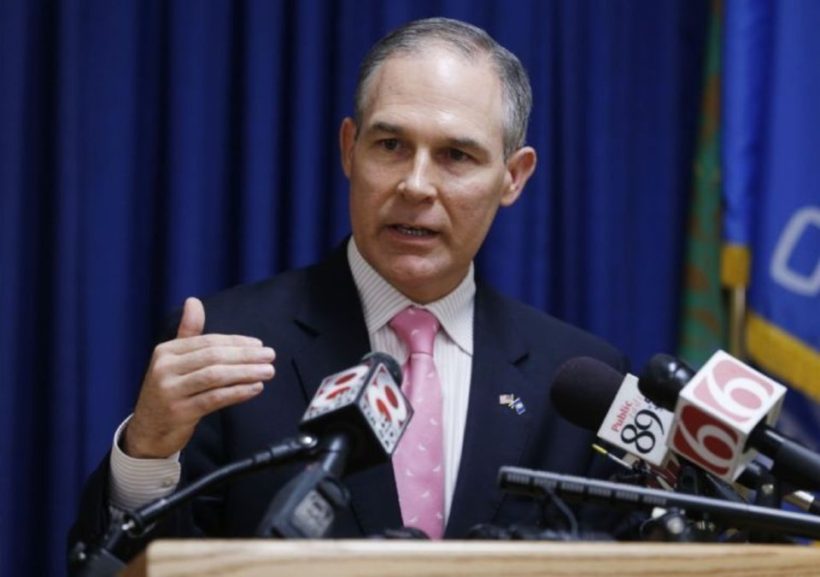
Oklahoma Attorney General Scott Pruitt
redo Jump to...
print Print...
(compiled from articles by Lawrence Hurley, Reuters and David G. Savage, LA Times) – [By a 6-2 vote], the Supreme Court on Monday threw out a lawsuit filed by the states of Nebraska and Oklahoma against their neighbor Colorado over a law approved as a ballot initiative by Colorado voters in 2012 that allows the recreational use of marijuana.
The court declined to hear the case filed by Nebraska and Oklahoma, which said that marijuana is being smuggled across their borders and noted that federal law still prohibits the drug. “The state of Colorado authorizes, oversees, protects and profits from a sprawling $100-million-per-month marijuana growing, processing and retailing organization that exported thousands of pounds of marijuana to some 36 states in 2014,” they said. “If this entity were based south of our border, the federal government would prosecute it as a drug cartel.”
They argued that Colorado’s law violates the federal Controlled Substances Act, which treats marijuana as a dangerous drug and forbids its sale or use. They urged the Supreme Court to take up the issue as an “original” matter and declare that Colorado’s law was preempted by the federal drug laws. They contended that drugs such as marijuana threaten the health and safety of children and argued that Colorado had created “a dangerous gap” in the federal drug control system.
Colorado stands by its law. It noted that the Obama administration has indicated the federal government lacks the resources and inclination to enforce fully the federal marijuana ban.
“The fact remains – Colorado marijuana continues to flow into Oklahoma in direct violation of federal and state law,” Oklahoma Attorney General Scott Pruitt said after the court’s action.

Colorado should stop refusing to take reasonable steps to prevent the flow of marijuana outside of its borders and the Obama administration should enforce federal law against marijuana, Pruitt added.
Nebraska Attorney General Doug Peterson expressed disappointment with the Supreme Court’s action, but said it does not bar new challenges to Colorado’s law in federal court.
Colorado has said that the Supreme Court was not the proper place to resolve the case. The lawsuit by Oklahoma and Nebraska was filed under the court’s “original jurisdiction,” which allows justices hear to disputes between states that are not first reviewed by lower courts. (SEE “Background” below for more on original jurisdiction.)
Colorado Attorney General Cynthia Coffman said the legal questions surrounding her state’s law “still require stronger leadership from Washington.”
Washington state also voted in 2012 to legalize recreational marijuana use by adults, while Oregon, Alaska and the District of Columbia followed in 2014.
Last year, the justices asked U.S. Solicitor Gen. Donald Verrilli to weigh in on the interstate legal battle over marijuana, and in December, he urged the court to turn away the lawsuit. Nebraska and Oklahoma have not suffered a “direct injury” from their neighbor to the West, he said, and they remain free to vigorously police marijuana in their states.
In response, the Nebraska and Oklahoma state attorneys said the Justice Department has “turned its back” on enforcing the federal law and is permitting it to be “dismantled by piecemeal nullification.”
“This was a meritless lawsuit, and the court made the right decision,” Mason Tvert of the pro-legalization Marijuana Policy Project said. “States have every right to regulate the cultivation and sale of marijuana, just as Nebraska and Oklahoma have the right to maintain their failed prohibition policies.”
Justices Clarence Thomas and Samuel A. Alito Jr. dissented Monday. “The plaintiff states have alleged significant harms to their sovereign interests caused by another state,” Thomas wrote. “We should let this complaint proceed further rather than denying leave without so much as a word of explanation.”
(Additional reporting from Reuters by Heide Brandes in Oklahoma City)
Compiled from news reports at Reuters and Los Angeles Times. Reprinted here for educational purposes only. May not be reproduced on other websites without permission.
Questions
1. On what grounds did the states of Nebraska and Oklahoma bring a lawsuit to the U.S. Supreme Court against Colorado? (Why did they file the suit against Colorado?) Be specific.
2. How did Colorado defend its law?
3. How did Oklahoma Attorney General Scott Pruitt respond when the Supreme Court declined to hear the case?
4. What did Nebraska Attorney General Doug Peterson say about the Court’s decision?
5. a) Under what constitutional provision did Oklahoma and Nebraska file the case directly with the Supreme Court?
b) Why were they able to file the suit with the Supreme Court without first taking the suit to a lower court?
6. a) Do you think Oklahoma and Nebraska make a reasonable case for their appeal to the court? Explain your answer.
b) Do you think the Court should have accepted the case? Explain your answer.
7.
- The U.S. Solicitor General is the third-highest ranking official in the U.S. Department of Justice.
- The Solicitor General is the person appointed to represent the federal government before the Supreme Court.
- Last year, the Supreme Court justices asked U.S. Solicitor Gen. Donald Verrilli to weigh in on the interstate legal battle over marijuana, and in December, he urged the court to turn away the lawsuit. Nebraska and Oklahoma have not suffered a “direct injury” from their neighbor to the West, he said, and they remain free to vigorously police marijuana in their states.
- In response, the Nebraska and Oklahoma state attorneys said the Justice Department has “turned its back” on enforcing the federal law and is permitting it to be “dismantled by piecemeal nullification.”
- In their dissent this week, Justices Clarence Thomas and Samuel A. Alito Jr. wrote, “The plaintiff states have alleged significant harms to their sovereign interests caused by another state. We should let this complaint proceed further rather than denying leave without so much as a word of explanation.”
With whom do you agree: the Solicitor General or the two justices? Explain your answer.
Background
FEDERAL LAW
It is important to recognize that state marijuana laws do not change the fact that using marijuana continues to be an offense under Federal law. Nor do state laws change the criteria or process for FDA approval of safe and effective medications. (from WhiteHouse .gov)
Federal law is created at the national level, and applies to the entire nation (all 50 states and the District of Columbia), and U.S. territories. The U.S. Constitution forms the basis for federal law; it establishes government power and responsibility, as well as preservation of the basic rights of every citizen.
State law is the law of each separate U.S. state and is applicable in that specific state. The state law applies to residents and visitors of the state, and also to business entities, corporations, or any organizations based or operating in that state.
When a state law is in direct conflict with federal law, the federal law prevails. (from Diffen)
Original Jurisdiction of the Supreme Court:
Article III, section 2, of the Constitution distributes the federal judicial power between the Supreme Court’s appellate and original jurisdiction, providing that the Supreme Court shall have original jurisdiction in “all cases affecting ambassadors, other public ministers and consuls,” and in cases to which a state is a party. In the Judiciary Act of 1789, Congress made the Supreme Court’s original jurisdiction exclusive over all civil actions between states, or between a state and the United States… (from wikipedia)
On the Supreme Court:
- Approximately 7,500 cases are sent to the Supreme Court each year. Out of these, only 80 to 100 are actually heard by the Supreme Court.
- When a case comes to the Supreme Court, several things happen. First, the Justices get together to decide if a case is worthy of being brought before the Court. In other words, does the case really involve Constitutional or federal law? Secondly, a Supreme Court ruling can affect the outcome of hundreds or even thousands of cases in lower courts around the country. Therefore, the Court tries to use this enormous power only when a case presents a pressing constitutional issue. …
- The Supreme Court convenes, or meets, the first Monday in October. It stays in session usually until late June of the next year. When they are not hearing cases, the Justices do legal research and write opinions. On Fridays, they meet in private (in “conference”) to discuss cases they’ve heard and to vote on them. …
- Most cases do not start in the Supreme Court. Usually cases are first brought in front of lower (state or federal) courts. Each disputing party is made up of a petitioner and a respondent.
- Once the lower court makes a decisions, if the losing party does not think that justice was served, s/he may appeal the case, or bring it to a higher court. In the state court system, these higher courts are called appellate courts. In the federal court system, the lower courts are called U.S. District Courts and the higher courts are called U.S. Courts of Appeals.
- If the higher court’s ruling disagrees with the lower court’s ruling, the original decision is overturned. If the higher court’s ruling agrees with the lower court’s decision, then the losing party may ask that the case be taken to the Supreme Court. But … only cases involving federal or Constitutional law are brought to the highest court in the land. (from BensGuide.gpo.gov)
THE U.S. COURT SYSTEM: There are two separate court systems in America. The federal court system deals with issues of law relating to those powers expressly or implicitly granted to it by the U.S. Constitution, while the state court systems deal with issues of law relating to those matters that the U.S. Constitution did not give to the federal government or explicitly deny to the states. (from uscourts.gov)
from BensGuide.gpo.gov:
- Most cases do not start in the Supreme Court. Usually cases are first brought in front of lower (state or federal) courts. Each disputing party is made up of a petitioner and a respondent.
- Once the lower court makes a decisions, if the losing party does not think that justice was served, s/he may appeal the case, or bring it to a higher court. In the state court system, these higher courts are called appellate courts. In the federal court system, the lower courts are called United States District Courts and the higher courts are called United States Courts of Appeals.
- If the higher court’s ruling disagrees with the lower court’s ruling, the original decision is overturned. If the higher court’s ruling agrees with the lower court’s decision, then the losing party may ask that the case be taken to the Supreme Court. But … only cases involving federal or Constitutional law are brought to the highest court in the land [the Supreme Court].
Daily “Answers” emails are provided for Daily News Articles, Tuesday’s World Events and Friday’s News Quiz.




